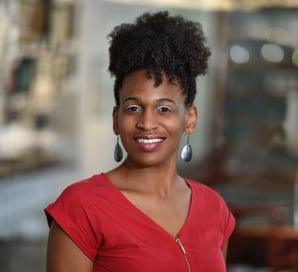
The VIC Fellows Program provides an opportunity for individuals with relevant expertise and interest to learn how to identify and evaluate promising innovation from global sources. We are pleased to highlight the members of the 2021-2022 class of Fellows in our ongoing series of interviews, such as this recent discussion with Secondra Holmes, PhD.
Please tell us about yourself and your background.

Professionally and personally, I take on many roles. I’m a chemist, pharmacologist, budding technology transfer specialist, community volunteer, dancer, and foodie. I have undergraduate and graduate degrees in chemistry from Texas A&M University and Sam Houston State University. My primary area of interest is the translation of research to the bedside. I am currently preparing to defend my PhD dissertation in Pharmacology at Baylor College of Medicine. I have a long-standing interest in the development of drugs and novel mechanisms of action.
As you are just getting started in your professional career, what are your long-term goals, and/or where do you see yourself in 5-10 years?This fellowship is strengthening my previous experience in intellectual property management, regulatory affairs and the business of healthcare startups. As a senior graduate student, it’s more than I could ask for. I believe there are positions available for me in these fields where I can serve the greater good and continue to learn. Though I currently study drug development as a bench scientist; my long-term career plan is as a life-science entrepreneurship. Over the next 5 to 10 years, I want to get to know and develop the skill set necessary to move an early-stage biotech company from creation to exit.
Given your interests, what do you see as the strengths and weaknesses of the Houston lifescience ecosystem? What about the local community is particularly helpful or challenging for those just getting started on their entrepreneurial journey?
Houston is the fourth-largest city by population. We have the largest medical center in the world. I’m a native Houstonian, and I’m proud of the potential that my city has to offer. Houston’s biotech scene is finally taking off, and I look forward to being involved in this community for the long-term. Boston and San Francisco are usually the first cities many think of when pondering healthcare entrepreneurship, but there are significant opportunities in cities that might not come to mind immediately, including Houston. The professional networks and financial support necessary to support biotech companies now exists in Houston and continues to grow as more companies join the local ecosystem.
What drew you to the VIC Fellows Program, and what are you hoping to get out of this experience?
I love, to a great extent, VIC’s mission to commercialize technologies developed in academia. A lot of outstanding inventions end up in “the valley of death.” Many see it and may write opinion pieces about it, but VIC is doing something about it. Their model is ideal for getting novel care to the patients who need it and builds a bridge of support for medical devices and therapeutics with significant commercial potential.
Since you are a VIC Fellow, while—at the same time—completing your PhD, how do you think that affects your learning experience?
The lab that I work in primarily focuses on early-stage small molecule development. Working with VIC greatly diversifies my knowledge base. It lets me experience what happens to a project after it has met the limits of an academic lab without having to leave the lab.
What do you see as the primary challenges facing those transitioning from traditional academic roles to private-sector opportunities?
What you prioritize in academic research is very different from what is prioritized in the private sector. Academic researchers get lost in science and love to ask and answer the questions that arise. Tangents push our understanding of projects and their mechanisms but focus on proof of efficacy and safety is the drive behind many drug development projects in the private sector. Scientists are curious by nature, and the biggest transitional challenge is understanding that you won’t always be able to immediately feed that curiosity.
Which life science trends are you most excited to see become real-world products?
Personalization. I know the development and regulatory hurdles slow how quickly the biotech community can adapt to personalized care, but the potential to improve human health is immense. Biology is complex and diverse enough that personalized medicine is likely the next major advancement in health, similar in potential impact to the invention of antibiotics or vaccines. I am personally interested in the apps designed around algorithms that help people tailor their fitness, diet, sleep, and more to their DNA, health, and lifestyle.
What would you like to see changed in academia to better prepare biomedical students for non-academic career paths?
While I do not get academic credit for my VIC fellowship, the experience is invaluable. Biomedical PhD training is traditionally built upon developing students for academic careers and focuses heavily on publishing first-author papers in top-tier journals. While many schools are making changes, there is still room for improvement. Baylor College of Medicine supports my career goals and the IDP (Individual development plan) of my peers with its Career Development Center, but like many schools, it has not made changes or added flexibility to the degree requirements. The overall result is that I, and many other students, are prepping for two careers at once.

